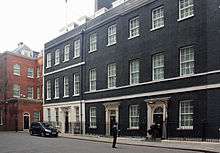National Security Council (United Kingdom)
.svg.png) | |
| Committee overview | |
|---|---|
| Formed | 12 May 2010 |
| Committee executives |
|
| Parent department | Cabinet Office |
| Website | National Security Council |
The National Security Council (NSC) of the United Kingdom is a Cabinet Committee tasked with overseeing all issues related to national security, intelligence coordination, and defence strategy. The terms of reference of the National Security Council are to consider matters relating to national security, foreign policy, defence, cyber security, resilience, energy and resource security.[1]
History
The NSC was established on 12 May 2010 by Prime Minister David Cameron. The Council is a Cabinet committee; it coordinates responses to threats faced by the United Kingdom and integrates at the highest level the work of relevant government entities with respect to national security.[2] The United Kingdom National Security Adviser (NSA) is secretary to the council. The NSA role is currently held by Sir Mark Sedwill, who commenced work as the UK's fourth NSA in April 2017.
From 1 April 2015 the council oversaw the newly created Conflict, Stability and Security Fund, a fund of more than £1 billion per year for tackling conflict and instability abroad.[3]
Council Membership
As of 9 July 2018, the NSC's membership is as follows:[4][5][6][7]
| Image | Officeholder | Office(s) |
|---|---|---|
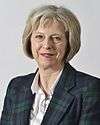 |
The Rt Hon. Theresa May MP | Prime Minister (Chair) |
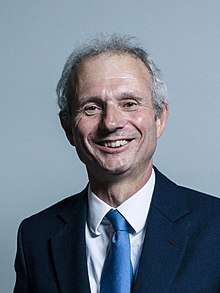 |
The Rt Hon. David Lidington CBE MP | Minister for the Cabinet Office (Deputy Chair) |
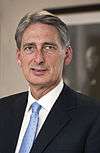 |
The Rt Hon. Philip Hammond MP | Chancellor of the Exchequer |
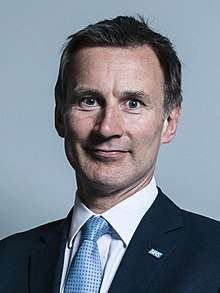 |
The Rt Hon. Jeremy Hunt MP | Foreign Secretary |
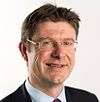 |
The Rt Hon. Greg Clark MP | Business, Energy and Industrial Strategy |
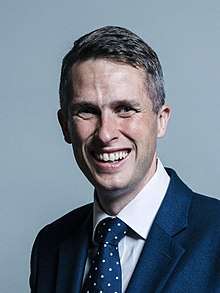 |
The Rt. Hon. Gavin Williamson CBE MP | Defence Secretary |
 |
The Rt. Hon. Penny Mordaunt MP | International Development Secretary |
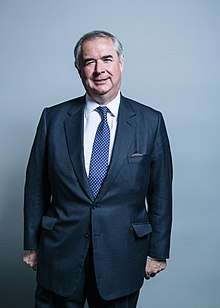 |
The Rt Hon. Geoffrey Cox QC MP | Attorney General for England and Wales & Advocate General for Northern Ireland |
Other government ministers, senior officials, military and intelligence officers attend as necessary, some on a regular basis. The Chief of the Defence Staff represents the Chiefs of Staff Committee at the NSC, not individual Chiefs of each service.[8] There are three subcommittees of the NSC,[9] Nuclear Deterrence and Security, Threats, Hazards, Resilience and Contingencies, and Strategic Defence and Security Review Implementation. The Leader of the Opposition has attended on an occasional basis.
Council Subcommittees
Nuclear Deterrence and Security Subcommittee
The Nuclear Deterrence and Security Subcommittee is a restricted attendance subcommittee of the National Security Council with the terms of references to consider issues relating to nuclear deterrence and security.[10]
| Officeholder | Office(s) |
|---|---|
| The Rt Hon. Theresa May MP | Prime Minister (Chair) |
| The Rt Hon. Philip Hammond MP | Chancellor of the Exchequer |
| The Rt Hon. Jeremy Hunt MP | Foreign Secretary |
| The Rt. Hon. Gavin Williamson MP | Defence Secretary |
| The Rt Hon. Greg Clark MP | Business Secretary (as required) |
Threats, Hazards, Resilience and Contingencies Subcommittee
The Threats, Hazards, Resilience and Contingencies Subcommittee is a subcommittee of the National Security Council with the terms of references to consider issues relating to terrorism and other security threats, hazards, resilience and intelligence policy and the performance and resources of the security and intelligence agencies; and report as necessary to the National Security Council.[10]
| Officeholder | Office(s) |
|---|---|
| The Rt Hon. David Lidington MP | Minister for the Cabinet Office (Chair) |
| The Rt Hon. Philip Hammond MP | Chancellor of the Exchequer |
| The Rt Hon. Jeremy Hunt MP | Foreign Secretary |
| The Rt Hon. Greg Clark MP | Business Secretary |
| The Rt Hon. James Brokenshire MP | Communities Secretary |
| The Rt Hon. Jeremy Wright MP | Culture Secretary |
| The Rt. Hon. Gavin Williamson MP | Defence Secretary |
| The Rt Hon. Damian Hinds MP | Education Secretary |
| The Rt Hon. Michael Gove MP | Environment Secretary |
| The Rt Hon. Matt Hancock MP | Health Secretary |
| The Rt Hon. Penny Mordaunt MP | International Development Secretary |
| The Rt Hon. David Gauke MP | Justice Secretary |
| The Rt Hon. Karen Bradley MP | Northern Ireland Secretary |
| The Rt Hon. Chris Grayling MP | Transport Secretary |
When secret intelligence matters are discussed by the subcommittee there is restricted attendance to Prime Minister, Minister for the Cabinet Office, Secretary of State for Foreign and Commonwealth Affairs, Chancellor of the Exchequer, Secretary of State for the Home Department, and Secretary of State for Defence.
Strategic Defence and Security Review Implementation Subcommittee
The Threats, Hazards, Resilience and Contingencies Subcommittee is a subcommittee of the National Security Council with the terms of references to consider matters relating to implementation of the Strategic Defence and Security Review (SDSR) and National Security Strategy.[10]
| Officeholder | Office(s) |
|---|---|
| The Rt Hon. David Lidington MP | Minister for the Cabinet Office |
| The Rt Hon. Jeremy Hunt MP | Foreign Secretary |
| The Rt Hon. Gavin Williamson MP | Defence Secretary |
| The Rt Hon. Greg Clark MP | Business Secretary |
| The Rt Hon. Penny Mordaunt MP | International Development Secretary |
| The Rt Hon. Liz Truss MP | Chief Secretary to the Treasury |
National Security Secretariat
The size and shape of the National Security Secretariat (NSS) and its senior leadership has fluctuated since its inception in May 2010. From July 2010, there were two Deputy National Security Advisers (DNSAs): Julian Miller for Foreign & Defence Policy and Oliver Robbins for Intelligence, Security & Resilience.[11] By March 2013, Hugh Powell - previously a National Security Secretariat Director - had been promoted to a newly created third DNSA position.[12] As of 6 November 2014, there were three DNSAs: Hugh Powell as DNSA (Foreign Policy), Julian Miller as DNSA (Defence, Nuclear and Strategy) and Paddy McGuinness as DNSA (Intelligence, Security & Resilience).[13] As of 10 February 2015, Liane Saunders - previously the National Security Secretariat's Director for Foreign Policy and its Afghanistan/Pakistan Coordinator - was described as an Acting Deputy National Security Adviser (Conflict, Stability and Foreign Policy).[14]
On 16 June 2016, the Cabinet Office released staff data, correct as of 31 March 2016, listing two current Deputy National Security Advisers: Paddy McGuinness (responsible for Intelligence, Security and Resilience) and Gwyn Jenkins (responsible for Conflict, Stability & Defence).[15] Jenkins appeared to have been in post since at least June 2015.[16] Prior to becoming a deputy National Security Adviser, Jenkins was the military assistant to prime minister David Cameron.[17]
As of April 2017, it was announced that a diplomat, Dr Christian Turner CMG, had replaced Jenkins as the second Deputy National Security Adviser, with a portfolio comprising 'foreign and defence policy.'[18] According to one of Turner's tweets, dated 13 April 2017, his first week as Deputy National Security Adviser was the week commencing Monday 10 April 2017.[19]
It was reported on 14 January 2018 that Paddy McGuinness was leaving the national security secretariat.[20] His successor as deputy national security adviser for intelligence, security and resilience, Richard Moore, announced his appointment on 8 January via his personal Twitter account.[21] Moore’s tenure as deputy NSA was relatively brief (circa three months), ending in early April when he returned to the Foreign and Commonwealth Office as Political Director, a move he also announced via Twitter on 8 April.[22]
As of early December 2014, the National Security Secretariat was staffed by 180 officials[23] and comprises five directorates: Foreign & Defence Policy; the Civil Contingencies Secretariat; Security & Intelligence; the Office of Cyber Security and Information Assurance, and UK Computer Emergency Response Team (CERT UK).[13]
See also
- The Committee of Imperial Defence - A precursor of the NSC.
References
- ↑ https://www.gov.uk/government/groups/national-security-council
- ↑ "Press Notice: Establishment of a National Security Council". Prime Minister's Office. 12 May 2010. Archived from the original on 9 January 2013.
- ↑ "Conflict, Stability and Security Fund inquiry launched". Joint Committee on the National Security Strategy. UK Parliament. 26 May 2016. Retrieved 26 November 2016.
- ↑ Joe Devanny. "Could Theresa May's appointment prompt a rethink of how Whitehall does national security?". Civil Service World. Retrieved 21 July 2016.
- ↑ https://www.gov.uk/government/uploads/system/uploads/attachment_data/file/678525/20180201_Cabinet_Committees_and_Implementation_Taskforces__2_.pdf
- ↑ "Fallon resigns over behaviour claims". BBC News. 2017-11-01. Retrieved 2017-11-01.
- ↑ "British minister Patel resigns, second cabinet departure in a week". Politico. 2017-11-08. Retrieved 2017-11-08.
- ↑ "House of Commons - Decision-making in Defence Policy - Defence". Retrieved 24 July 2016.
- ↑ "Cabinet Committee Memberships" (PDF). Cabinet Office HM Government. June 2010. Archived from the original (PDF) on 2010-11-10. Retrieved 5 August 2010.
- 1 2 3 UK Cabinet Committees Membership
- ↑ "Cabinet Office Structure Charts, page 12" (PDF). Cabinet Office HM Government. May 2010. Archived from the original (PDF) on July 5, 2010. Retrieved 6 July 2010.
- ↑ "Cabinet Office staff and salary data – senior posts as at 31 March 2013". Retrieved 7 November 2014.
- 1 2 Dr Joe Devanny & Josh Harris. "The National Security Council: national security at the centre of government". Institute for Government & King's College London. Retrieved 6 November 2014.
- ↑ Sophia Adhami. "Security and Diversity". Cabinet Office. Retrieved 23 March 2015.
- ↑ "Cabinet Office staff and salary data: senior posts as at 31 March 2016". Cabinet Office. Retrieved 29 July 2016.
- ↑ "KRG Deputy PM meets UK officials". Kurdistan Regional Government. Archived from the original on 18 August 2016. Retrieved 29 July 2016.
- ↑ "Letter from the Military Assistant" (PDF). Prime Minister's Office. Retrieved 29 July 2016.
- ↑ "Dr Christian Turner". Cabinet Office. Retrieved 1 September 2017.
- ↑ @CTurnerFCO. "A busy first week as Deputy National Security Adviser; farewell to @LyallGrant looking forward to working with @marksedwill". Twitter. Retrieved 1 September 2017.
- ↑ Richard Kerbaj (14 January 2018). "British security chief to advise Qatar on World Cup security". The Times. Retrieved 30 April 2018.
- ↑ @UKPolDirRichard (8 January 2018). "Excited to be starting my new job as DNSA today. "Allah utandırmasın" as the Turks say - meaning roughly "Let him not mess it up"". Twitter. Retrieved 30 April 2018.
- ↑ @UKPolDirRichard (8 April 2018). "Thrilled & honoured to be starting as U.K. Political Director in @foreignoffice tomorrow. Much to learn, much to do. Looking forward to it". Twitter. Retrieved 30 April 2018.
- ↑ "National Security Council:Written question - 215980". Retrieved 15 December 2014.
